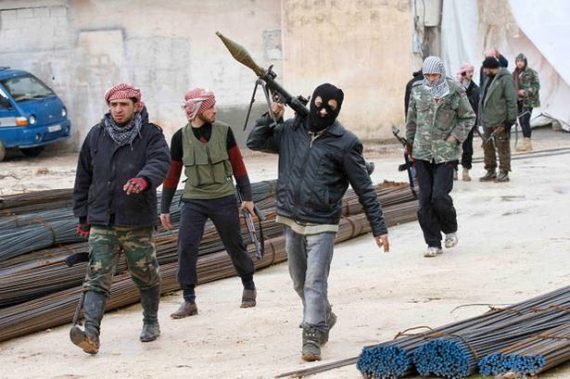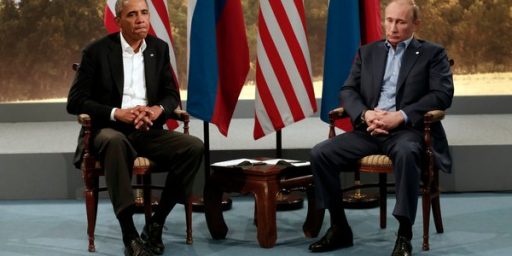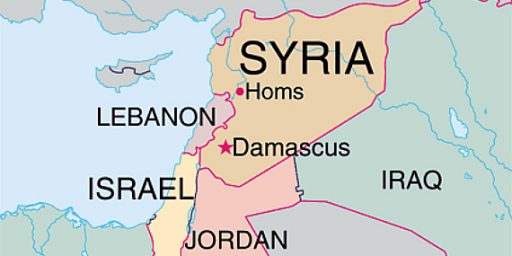Jihadists Getting Most Of The Weapons Going To Syrian Rebels
The worst elements among the Syrian rebels seem to be the ones getting the arms.
David Sanger notes in today’s New York Times that most of the weapons going to the Syrian rebels are going to the most radical elements among them:
WASHINGTON — Most of the arms shipped at the behest of Saudi Arabia and Qatar to supply Syrian rebel groups fighting the government of Bashar al-Assad are going to hard-line Islamic jihadists, and not the more secular opposition groups that the West wants to bolster, according to American officials and Middle Eastern diplomats.
That conclusion, of which President Obama and other senior officials are aware from classified assessments of the Syrian conflict that has now claimed more than 25,000 lives, casts into doubt whether the White House’s strategy of minimal and indirect intervention in the Syrian conflict is accomplishing its intended purpose of helping a democratic-minded opposition topple an oppressive government, or is instead sowing the seeds of future insurgencies hostile to the United States.
“The opposition groups that are receiving the most of the lethal aid are exactly the ones we don’t want to have it,” said one American official familiar with the outlines of those findings, commenting on an operation that in American eyes has increasingly gone awry.
The United States is not sending arms directly to the Syrian opposition. Instead, it is providing intelligence and other support for shipments of secondhand light weapons like rifles and grenades into Syria, mainly orchestrated from Saudi Arabia and Qatar. The reports indicate that the shipments organized from Qatar, in particular, are largely going to hard-line Islamists.
This seems to be part of a broader problem with the Syrian opposition that boils down to the fact that there doesn’t appear to be any such thing as a unified Syrian opposition, and that seems to be heading down a path that favors the radicals in the event the Assad Government should suddenly collapse:
Another Middle Eastern diplomat whose government has supported the Syrian rebels said his country’s political leadership was discouraged by the lack of organization and the ineffectiveness of the disjointed Syrian opposition movement, and had raised its concerns with American officials. The diplomat, who spoke on the condition of anonymity because he was discussing delicate intelligence issues, said the various rebel groups had failed to assemble a clear military plan, lacked a coherent blueprint for governing Syria afterward if the Assad government fell, and quarreled too often among themselves, undercutting their military and political effectiveness.
“We haven’t seen anyone step up to take a leadership role for what happens after Assad,” the diplomat said. “There’s not much of anything that’s encouraging. We should have lowered our expectations.”
The disorganization is strengthening the hand of Islamic extremist groups in Syria, some with ties or affiliations with Al Qaeda, he said: “The longer this goes on, the more likely those groups will gain strength.”
As Sanger notes, developments like these call into question both the Obama Administration’s policy in Syria and the alternative that Mitt Romney says he would implement a were he President. Calling for the removal of Bashar Assad from power without having any clear idea of who or what would be replacing him is the same mistake we made in Iraq in 2003. Some have also argued that a similar mistake was made in Egypt in the wake of Mubarak’s removal from power, although it’s unclear how much we really could have influenced the political future of that nation. And, it certainly was the case in Libya where we overlooked the role of groups sympathetic to al Qaeda in the rebellion, especially in the nation’s east where they have now established something of a stronghold. In Syria, though, we have a choice. We could have, and can still, choose to hold back our support for the rebels until we have a better idea of who they are and what the post-Assad Syria would look like.
Mitt Romney’s ideas aren’t much better, though. He said in his speech at VMI last Monday that he would take steps to ensure that arms are going to elements of the Syrian rebellion that we can trust, but it’s unclear how he’s going to do that without convincing the Saudis and Qataris to be more discriminating in who they deal with. Right now, they don’t appear to be interested in doing that. So, it’s hard to see how his policy would be any more workable than what we have now.
Commenting on this story, Walter Russell Mead goes back to his idea of the United States arming the rebels. However, as I noted last week, that’s a strategy that poses problems of its own. Indeed, the fact that the arms now going into Syria have been going to the most undesirable elements strikes me as a pretty strong argument against the U.S. getting further involved in this conflict than we already are. At the very least, though, the prospect of yet another Arab country falling into the hands of Islamist radicals or, barring that, into a post-Assad civil war between those competing for power is certainly a concern. I’m not sure what the answer is, but I don’t think that getting further involved is the answer.







As I commented last week,
Assad is on the way out. Our thinking needs to be dominated by what happens next. My best guess: a really big version of Lebanon, circa 1979.
Given Assad’s support of Hizbollah and other terrorists, it’s not clear the an Al Qeda allied- fundamentalist regime would be worse than the current regime. A Sunni-fundamentalist state would also almost certainly break with Iran, which would weaken Hizbollah and be a win for the Israelis. Also, a Syria run by Jihadist would be a weaker state than the Baathist state has been, and thus far less capable of projecting power.
But of course, it’s not that simple.
I agree we should assume that any weapon shipped to Syria may well be turned against us by a future terrorist. But that just means we have to be very careful what we ship in. We sent Stingers to Afghanistan, after all, so we now how to do this.
I am completely opposed to any formal US military presence in Syria. But Syria is heading for some nasty years of civil war; we’d be wise to curry favor wherever we can. If that means a few hundred more .50 calibers machine guns get mounted on Jihadist pickup trucks, I say go for it.
So in the wake of an Assad collapse we could end up with a sort of second civil war pitting Hezbollah against Al Qaeda for control in Damascus. Is that not the very definition of a thing we want to stay out of?
If you liked the Iran/Iraq war, you’ll love what’s happening in Syria.
I think Bibi’s saying a lot of prayers for Bashir Al-Assad’s health these days.
Not sure there are any easy answers, but for the moment I don’t think arming anyone in Syria is a good idea, because of the likelihood that the arms end up in the hands of people we don’t want to have them.
I am not really sure there is much the US can do to influence who replaces Assad, but the writing on the wall says Assad is going to be gone soon (either killed or in exile). I almost think in this case stepping back and letting the chips fall may work, but then Turkey complicates things.
@Tylerh:
You are sick. I say we ship you off to Syria.